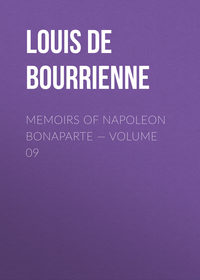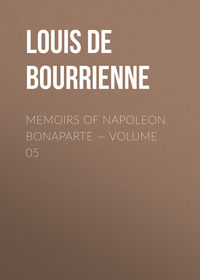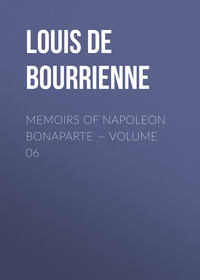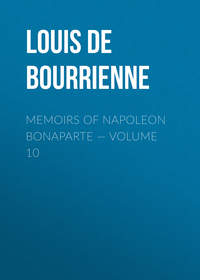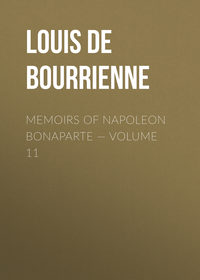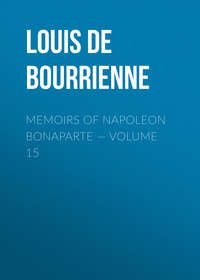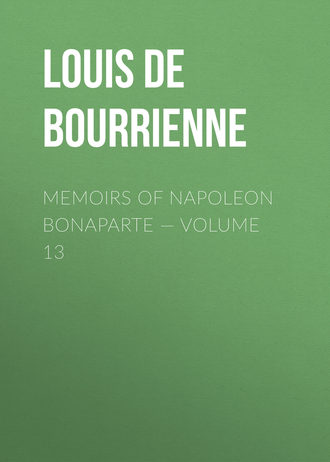 полная версия
полная версияMemoirs of Napoleon Bonaparte — Volume 13
As soon as the Emperor quitted Lyons he wrote to Ney, who with his army was at Lons-le-Saulnier, to come and join him. Ney had set off from the Court with a promise to bring Napoleon, "like a wild beast in a cage, to Paris." Scott excuses Ney's heart at the expense of his head, and fancies that the Marshal was rather carried away by circumstances, by vanity, and by fickleness, than actuated by premeditated treachery, and it is quite possible that these protestations were sincerely uttered when Ney left Paris, but, infected by the ardour of his troops, he was unable to resist a contagion so much in harmony with all his antecedents, and to attack not only his leader in many a time of peril, but also the sovereign who had forwarded his career through every grade of the army.
The facts of the cane were these:—
On the 11th of March Ney, being at Besancon, learned that Napoleon was at Lyons. To those who doubted whether his troops would fight against their old comrades he said, "They shall fight! I will take a musket from a grenadier and begin the action myself! I will run my sword to the hilt in the body of the first man who hesitates to fire." At the same time he wrote to the Minister of War at Paris that he hoped to see a fortunate close to this mad enterprise.
He then advanced to Lons-le-Saulnier, where, on the night between the 13th and 14th of March, not quite three days after his vehement protestations of fidelity, he received, without hesitation, a letter from Bonaparte, inviting him, by his old appellation of the "Bravest of the Brave," to join his standard. With this invitation Ney complied, and published an order of the day that declared the cause of the Bourbons, which he had sworn to defend, lost for ever.
It is pleaded in extenuation of Ney's defection that both his officers and men were beyond his control, and determined to join their old Master; but in that case he might have given up his command, and retired in the same honourable way that Marshals Macdonald and Marmont and several other generals did. But even among his own officers Ney had an example set him, for many of them, after remonstrating in vain, threw up their commands. One of them broke his sword in two and threw the pieces at Ney's feet, saying, "It is easier for a man of honour to break iron than to break his word."
Napoleon, when at St. Helena, gave a very different reading to these incidents. On this subject he was heard to say, "If I except Labedoyere, who flew to me with enthusiasm and affection, and another individual, who, of his own accord, rendered me important services, nearly all the other generals whom I met on my route evinced hesitation and uncertainty; they yielded only to the impulse about them, if indeed they did not manifest a hostile feeling towards me. This was the case with Ney, with Massena, St. Cyr, Soult, as well as with Macdonald and the Duke of Belluno, so that if the Bourbons had reason to complain of the complete desertion of the soldiers and the people, they had no right to reproach the chiefs of the army with conspiring against them, who had shown themselves mere children in politics, and would be looked upon as neither emigrants nor patriots."
Between Lyons and Fontainebleau Napoleon often travelled several miles ahead of his army with no other escort than a few Polish lancers. His advanced guard now generally consisted of the troops (miscalled Royal) who happened to be before him on the road whither they had been sent to oppose him, and to whom couriers were sent forward to give notice of the Emperor's approach, in order that they might be quite ready to join him with the due military ceremonies. White flags and cockades everywhere disappeared; the tri-colour resumed its pride of place. It was spring, and true to its season the violet had reappeared! The joy of the soldiers and the lower orders was almost frantic, but even among the industrious poor there were not wanting many who regretted this precipitate return to the old order of things—to conscription, war, and bloodshed, while in the superior classes of society there was a pretty general consternation. The vain, volatile soldiery, however, thought of nothing but their Emperor, saw nothing before them but the restoration of all their laurels, the humiliation of England, and the utter defeat of the Russians, Prussians, and Austrians.
On the night between the 19th and 20th of March Napoleon reached Fontainebleau, and again paused, as had formerly been his custom, with short, quick steps through the antiquated but splendid galleries of that old palace. What must have been his feelings on revisiting the chamber in which, the year before, it is said he had attempted suicide!
Louis XVIII., left the Palace of the Tuileries at nearly the same hour that Bonaparte entered that of Fontainebleau.
The most forlorn hope of the Bourbons was now in a considerable army posted between Fontainebleau and Paris. Meanwhile the two armies approached each other at Melun; that of the King was commanded by Marshal Macdonald. On the 20th his troops were drawn up in three lines to receive the invaders, who were said to be advancing from Fontainebleau. There was a long pause of suspense, of a nature which seldom fails to render men more accessible to strong and sudden emotions. The glades of the forest, and the acclivity which leads to it, were in full view of the Royal army, but presented the appearance of a deep solitude. All was silence, except when the regimental bands of music, at the command of the officers, who remained generally faithful, played the airs of "Vive Henri Quatre," "O Richard," "La Belle Gabrielle," and other tunes connected with the cause and family of the Bourbons. The sounds excited no corresponding sentiments among the soldiers.
At length, about noon, a galloping of horse was heard. An open carriage appeared, surrounded by a few hussars, and drawn by four horses. It came on at full speed, and Napoleon, jumping from the vehicle, was in the midst of the ranks which had been formed to oppose him. His escort threw themselves from their horses, mingled with their ancient comrades, and the effect of their exhortations was instantaneous on men whose minds were already half made up to the purpose which they now accomplished. There was a general shout of "Vive Napoleon!" The last army of the Bourbons passed from their side, and no further obstruction existed betwixt Napoleon and the capital, which he was once more—but for a brief space—to inhabit as a sovereign.
Louis, accompanied only by a few household troops, had scarcely turned his back on the capital of his ancestors when Lavalette hastened from a place of concealment and seized on the Post-office in the name of Napoleon. By this measure all the King's proclamations' were intercepted, and the restoration of the Emperor was announced to all the departments. General Excelmans, who had just renewed his oath to Louis, pulled down with his own hands the white flag that was floating over the Tuileries, and hoisted the three-coloured banner.
It was late in the evening of the 20th that Bonaparte entered Paris in an open carriage, which was driven straight to the gilded gates of the Tuileries. He received the acclamations of the military and of the lower classes of the suburbs, but most of the respectable citizens looked on in silent wonderment. It was quite evident then that he was recalled by a party—a party, in truth, numerous and powerful, but not by the unanimous voice of the nation. The enthusiasm of his immediate adherents, however, made up for the silence and lukewarmness of others. They filled and crammed the square of the Carrousel, and the courts and avenues of the Tuileries; they pressed so closely upon him that he was obliged to cry out, "My friends, you stifle me!" and his aides de camp were compelled to carry him in their arms up the grand staircase, and thence into the royal apartments. It was observed, however, that amongst these ardent friends were many men who had been the first to desert him in 1814, and that these individuals were the most enthusiastic in their demonstrations, the loudest in their shouts!
And thus was Napoleon again at the Tuileries, where, even more than at Fontainebleau, his mind was flooded by the deep and painful recollections of the past! A few nights after his return thither he sent for M. Horan, one of the physicians who had attended Josephine during her last illness. "So, Monsieur Horan," said he, "you did not leave the Empress during her malady?"—"No, Sire."
What was the cause of that malady?"—"Uneasiness of mind . . .grief."— "You believe that?" (and Napoleon laid a strong emphasis on the word believe, looking steadfastly in the doctor's face). He then asked, "Was she long ill? Did she suffer much?"—"She was ill a week, Sire; her Majesty suffered little bodily pain."—"Did she see that she was dying? Did she show courage?"—"A sign her Majesty made when she could no longer express herself leaves me no doubt that she felt her end approaching; she seamed to contemplate it without fear."—" Well! . . well!" and then Napoleon much affected drew close to M. Horan, and added, "You say that she was in grief; from what did that arise?"—"From passing events, Sire; from your Majesty's position last year."—" Ah! she used to speak of me then?"—"Very often." Here Napoleon drew his hand across his eyes, which seemed filled with tears. He then went on. "Good woman!—Excellent Josephine! She loved me truly—she—did she not? . . . Ah! She was a Frenchwoman!"—"Yes, Sire, she loved you, and she would have proved it had it not been for dread of displeasing you: she had conceived an idea." —"How? … What would she have done?" She one day said that as Empress of the French she would drive through Paris with eight horses to her coach, and all her household in gala livery, to go and rejoin you at Fontainebleau, and never quit you mare."—"She would have done it—she was capable of doing it!"
Napoleon again betrayed deep emotion, on recovering from which he asked the physician the most minute questions about the nature of Josephine's disease, the friends and attendants who were around her at the hour of her death, and the conduct of her two children, Eugene and Hortense.
CHAPTER V
1815.
Message from the Tuileries— My interview with the King— My appointment to the office of Prefect of the Police— Council at the Tuileries— Order for arrests— Fouches escape— Davoust unmolested— Conversation with M. de Blacas— The intercepted letter, and time lost— Evident understanding between Murat and Napoleon— Plans laid at Elba— My departure from Paris— The post-master of Fins— My arrival at Lille— Louis XVIII. detained an hour at the gates— His majesty obliged to leave France— My departure for Hamburg— The Duc de Berri at Brussels.
Those who opposed the execution of the treaty concluded with Napoleon at the time of his abdication were guilty of a great error, for they afforded him a fair pretext for leaving the island of Elba. The details of that extraordinary enterprise are known to every one, and I shall not repeat what has been told over and over again. For my own part, as soon as I saw with what rapidity Bonaparte was marching upon Lyons, and the enthusiasm with which he was received by the troops and the people, I prepared to retire to Belgium, there to await the denouement of this new drama.
Every preparation for my departure was completed on the evening of the 13th of March, and I was ready to depart, to avoid the persecutions of which I expected I should be the object, when I received a message from the Tuileries stating that the King desired to see me. I of course lost no time in proceeding to the Palace, and went straight to M. Hue to inquire of him why I had been sent for. He occupied the apartments in which I passed the three most laborious and anxious years of my life. M. Hue, perceiving that I felt a certain degree of uneasiness at being summoned to the Tuileries at that hour of the night, hastened to inform me that the King wished to appoint me Prefect of the Police. He conducted me to the King's chamber, where his Majesty thus addressed me kindly, but in an impressive manner, "M. de Bourrienne, can we rely upon you? I expect much from your zeal and fidelity."—"Your Majesty," replied I, "shall have no reason to complain of my betraying your confidence."—" Well, I re-establish the Prefecture of the Police, and I appoint you Prefect. Do your best, M. de Bourrienne, in the discharge of your duties; I count upon you."
By a singular coincidence, on the very day (the 13th of March) when I received this appointment Napoleon, who was at Lyons, signed the decree which excluded from the amnesty he had granted thirteen individuals, among whose names mine was inscribed. This decree confirmed me in the presentiments I had conceived as soon as I heard of the landing of Bonaparte. On returning home from the Tuileries after receiving my appointment a multitude of ideas crowded on my mind. At the first moment I had been prompted only by the wish to serve the cause of the King, but I was alarmed when I came to examine the extent of the responsibility I had taken upon myself. However, I determined to meet with courage the difficulties that presented themselves, and I must say that I had every reason to be satisfied with the manner in which I was seconded by M. Foudras, the Inspector-General of the Police.
Even now I am filled with astonishment when I think of the Council that was held at the Tuileries on the evening of the 13th of March in M. de Blacas' apartments. The ignorance of the members of that Council respecting our situation, and their confidence in the useless measures they had adopted against Napoleon, exceed all conception.
Will it be believed that those great statesmen, who had the control of the telegraph, the post-office, the police and its agents, money-in short, everything which constitutes power—asked me to give them information respecting the advance of Bonaparte? What could I say to them? I could only repeat the reports which were circulated on the Exchange, and those which I had collected here and there during the last twenty-four hours. I did not conceal that the danger was imminent, and that all their precautions would be of no avail. The question then arose as to what course should be adapted by the King. It was impossible that the monarch could remain at the Capital, and yet, where was he to go? One proposed that he should go to Bordeaux, another to La Vendee, and a third to Normandy, and a fourth member of the Council was of opinion that the King should be conducted to Melun. I conceived that if a battle should take place anywhere it would probably be in the neighbourhood of that town, but the councillor who made this last suggestion assured us that the presence of the King in an open carriage and eight horses would produce a wonderful effect on the minds of the troops. This project was merely ridiculous; the others appeared to be dangerous and impracticable. I declared to the Council that, considering the situation of things, it was necessary to renounce all idea of resistance by force of arms; that no soldier would fire a musket, and that it was madness to attempt to take any other view of things. "Defection," said I, "is inevitable. The soldiers are drinking in their barracks the money which you have been giving them for some days past to purchase their fidelity. They say Louis XVIII., is a very decent sort of man, but 'Vive le petit Caporal!'"
Immediately on the landing of Napoleon the King sent an extraordinary courier to Marmont, who was at Chatillon whither he had gone to take a last leave of his dying mother. I saw him one day after he had had an interview with the King; I think it was on the 6th or 7th of March. After some conversation on the landing of Napoleon, and the means of preventing him from reaching Paris, Marmont said to me, "This is what I dwelt most strongly upon in the interview I have just had with the King. 'Sire,' said I, 'I doubt not Bonaparte's intention of coming to Paris, and the best way to prevent him doing so would be for your Majesty to remain here. It is necessary to secure the Palace of the Tuileries against a surprise, and to prepare it for resisting a siege, in which it would be indispensable to use cannon. You must shut yourself up in your palace, with the individuals of your household and the principal public functionaries, while the Due d'Angoulome should go to Bordeaux, the Duc de Berri to La Vendee, and Monsieur to, the Franche-Comte; but they must set off in open day, and announce that they are going to collect defenders for your Majesty.—[Monsieur, the brother of the King, the Comte d'Artois later Charles X.]
". . This is what I said to the King this morning, and I added that I would answer for everything if my advice were followed. I am now going to direct my aide de camp, Colonel Fabvier, to draw up the plan of defence." I did not concur in Marmont's opinion. It is certainly probable that had Louis XVIII. remained in his palace the numerous defections which took place before the 20th of March would have been checked and some persons would not have found so ready an excuse for breaking their oaths of allegiance. There can be little doubt, too, but Bonaparte would have reflected well before he attempted the siege of the Tuileries.
—[Marmont (tome vii. p. 87) gives the full details of his scheme for provisioning and garrisoning the Tuileries which the King was to hold while his family spread themselves throughout the provinces. The idea had nothing strange in it, for the same advice was given by General Mathieu Dumas (Souvenirs, tome iii. p. 564), a man not likely to suggest any rash schemes. Jaucourt, writing to Talleyrand, obviously believed in the wisdom of the King's remaining, as did the Czar; see Talleyrand's Correspondence, vol. ii. pp. 94, 122, 129. Napoleon would certainly have been placed in a strange difficulty, but a king capable of adopting such a resolution would never have been required to consider it.]—
Marmont supported his opinion by observing that the admiration and astonishment excited by the extraordinary enterprise of Napoleon and his rapid march to Paris would be counterbalanced by the interest inspired by a venerable monarch defying his bold rival and courageously defending his throne. While I rendered full justice to the good intentions of the Duke of Ragusa, yet I did not think that his advice could be adopted. I opposed it as I opposed all the propositions that were made in the Council relative to the different places to which the King should retire. I myself suggested Lille as being the nearest, and as presenting the greatest degree of safety, especially in the first instance.
It was after midnight when I left the Council of the Tuileries. The discussion had terminated, and without coming to any precise resolution it was agreed that the different opinions which had been expressed should be submitted to Louis XVIII. in order that his Majesty might adopt that which should appear to him the best. The King adopted my opinion, but it was not acted upon until five days after.
My appointment to the Prefecture of the Police was, as will be seen, a late thought of measure, almost as late indeed as Napoleon's proposition to send me as his Minister Plenipotentiary to Switzerland. In now accepting office I was well convinced of the inutility of any effort that might be made to arrest the progress of the fast approaching and menacing events. Being introduced into the King's cabinet his Majesty asked me what I thought of the situation of affairs. "I think, Sire, that Bonaparte will be here in five or six days."—"What, sir?"—"Yes, Sire." —"But proper measures are taken, the necessary orders given, and the Marshals are faithful to me."—"Sire, I suspect no man's fidelity; but I can assure your Majesty that, as Bonaparte has landed, he will be here within a week. I know him, and your Majesty cannot know him as well as I do; but I can venture too assure your Majesty with the same confidence that he will not be here six months hence. He will be hurried into acts of folly which will ruin him."—"De Bourrienne, I hope the best from events, but if misfortune again compel me to leave France, and your second prediction be fulfilled, you may rely on me." During this short conversation the King appeared perfectly tranquil and resigned.
The next day I again visited the Tuileries, whither I had at those perilous times frequent occasion to repair. On that day I received a list of twenty-five persons whom I was ordered to arrest. I took the liberty to observe that such a proceeding was not only useless but likely to produce a very injurious effect at that critical moment. The reasons I urged had not all the effect I expected. However, some relaxation as to twenty-three of the twenty-five was conceded, but it was insisted that Fouche and Davoust should be arrested without delay. The King repeatedly said, "I wish you to arrest Fouche."—" Sire, I beseech your Majesty to consider the inutility of such a measure."—" I am resolved upon Fouches arrest. But I am sure you will miss him, for Andre could not catch him."
My nocturnal installation as Prefect of the Police took place some time after midnight. I had great repugnance to the arrest of Fouche, but the order having been given, there was no alternative but to obey it. I communicated the order to M. Foudras, who very coolly observed, "Since we are to arrest him you need not be afraid, we shall have him fast tomorrow."
The next day my agents repaired to the Duke of Otranto's hotel, in the Rue d'Artois. On showing their warrant Fouche said, "What does this mean? Your warrant is of no force; it is mere waste-paper. It purports to come from the Prefect of the Police, but there is no such Prefect." In my opinion Fouche was right, for my appointment, which took place during the night, had not been legally announced. Be that as it may, on his refusal to surrender, one of my agents applied to the staff of the National Guard, requesting the support, in case of need, of an armed force. General Dessolles repaired to the Tuileries to take the King's orders on the subject. Meanwhile Fouche, who never lost his self- possession, after talking to the police officers who remained with him, pretended to step aside for some indispensable purpose, but the door which he opened led into a dark passage through which he slipped, leaving my unfortunate agents groping about in the obscurity. As for himself, he speedily gained the Rue Taitbout, where he stepped into a coach, and drove off. This is the whole history of the notable arrest of Fouche.
As for Davoust, I felt my hands tied with respect to him. I do not mean to affect generosity, for I acknowledge the enmity I bore him; but I did not wish it to be supposed that I was acting towards him from a spirit of personal vengeance. I therefore merely ordered him to be watched. The other twenty-three were to me in this matter as if they had never existed; and some of them, perhaps, will only learn in reading my Memoirs what dangerous characters they were thought to be.
On the 15th of March, after the conversation which, as I have already related, I had with Louis XVIII, I went to M. de Blacas and repeated to him what I had stated to the King on the certainty of Bonaparte's speedy arrival in Paris. I told him that I found it necessary to devote the short time still in our power to prevent a reaction against the Royalists, and to preserve public tranquillity until the departure of the Royal family, and that I would protect the departure of all persons who had reasons for withdrawing themselves from the scene of the great and perhaps disastrous events that might ensue. "You may readily believe, Count," added I, "that considering the great interests with which I am entrusted, I am not inclined to lose valuable time in arresting the persons of whose names I have received a list. The execution of such a measure would be useless; it would lead to nothing, or rather it would serve to irritate public feeling. My conviction of this fact has banished from me all idea of keeping under restraint for four or five days persons whose influence, whether real or supposed, is nil, since Bonaparte is at Auxerre. Mere supervision appears to me sufficient, and to that I propose confining myself."—"The King," replied M. de Blacas, "relies on you. He knows that though only forty-eight hours have elapsed since you entered upon your functions, you have already rendered greater services than you are perhaps aware of." I then asked M. de Blacas whether he had not received any intimation of Bonaparte's intended departure from the island of Elba by letters or by secret agents. "The only positive information we received," answered the Minister, "was an intercepted letter, dated Elba, 6th February. It was addressed to M. ——-, near Grenoble. I will show it you." M. de Blacas opened a drawer of his writing-table and took out the letter, which he gave to me. The writer thanked his correspondent for the information he had transmitted to "the inhabitant of Elba." He was informed that everything was ready for departure, and that the first favourable opportunity would be seized, but that it would be desirable first to receive answers to some questions contained in the letter. These questions related to the regiments which had been sent into the south, and the places of their cantonment. It was inquired whether the choice of the commanders was conformable to what had been agreed on in Paris, and whether Labedoyere was at his post. The letter was rather long and it impressed me by the way in which the plan of a landing on the coast of Provence was discussed. Precise answers were requested on all these points. On returning the letter to M. de Blacas I remarked that the contents of the letter called for the adoption of some decided measures, and I asked him what had been done. He answered, "I immediately sent a copy of the letter to M. d'Andre, that he might give orders for arresting the individual to whom it was addressed."


